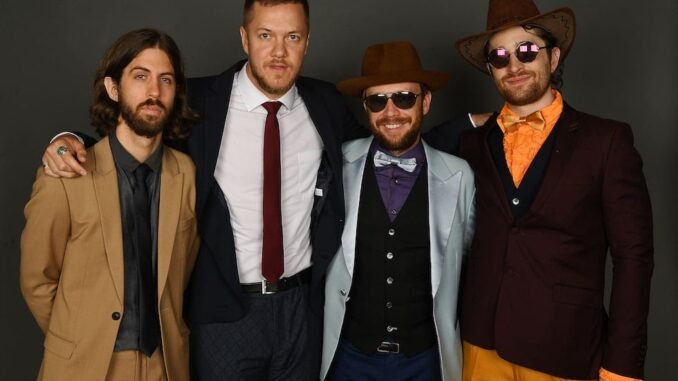
Imagine Dragons: “The Worst Band Ever” or a Refuge for Young Fans?…read more…
When El País asked in April whether Imagine Dragons are “the worst band ever” or a lifeline for millions of young people, it captured a persistent paradox: a group marked by staggering commercial success yet persistently criticized by critics and a segment of listeners .
—
🎧 Global Reach vs. Critical Scorn
Since their debut in 2012 with Night Visions, Imagine Dragons have sold 74 million albums and amassed over 160 billion streams . Three of their biggest hits – Radioactive, Believer, and Thunder – have become the most played rock songs of the 2010s . Their success continued with 2024’s Loom and an energetic Loom World Tour, including a concert film recorded at the Hollywood Bowl .
Yet their widespread popularity hasn’t shielded them from criticism. Spin once ran a piece headlined “Is Imagine Dragons the Worst Band Ever?”, citing “motivational platitudes and pseudo‑dramatic yelps” . In online forums and Reddit threads, fans describe them as over‑exposed and formulaic, even while acknowledging the band’s charitable values .
—
🗣️ Critics: “Generic, Overexposed, Formulaic”
Skeptics often brand Imagine Dragons as a by‑product of musical capitalism, capable of topping charts but lacking artistic depth. El País music critic Sebas Alonso summarized this tension: their lyrics may touch on real issues—mental health, loss, toxic masculinity—but are often delivered in a literal, unsophisticated way .
Reddit user PixelLumi echoed a common sentiment:
> “Overexposure. The fact that they are playing everywhere and the fact that their most popular songs are their worst…” .
Even accomplished rock artists like Slipknot’s Corey Taylor liken them to the new Nickelback—a poster child for mainstream rock disdain .
Critiques generally fall into two buckets:
1. Generic, overproduced sound—arena‑ready but devoid of nuance.
2. Simplistic lyrics—emotional clichés over anything resembling poetic insight.
—
❤️ Fans & Supporters: A Source of Hope
On the flip side, countless fans find genuine solace in their concerts and music:
Mental Health Advocacy: Frontman Dan Reynolds is transparent about his struggles with depression and anxiety. He founded the Tyler Robinson Foundation in honor of a fan with cancer, and has spoken openly about mental illness .
Safe Space Creation: “Imagine Dragons is more than music. It’s a refuge,” says a País fan admin known as Aina, who credits Reynolds’s candid remarks with inspiring her return to therapy .
Championing LGBTQ+ Rights: The band has consistently defended LGBTQ+ rights, raised the trans pride flag at concerts, and openly supported inclusion .
Direct Engagement: Fans describe the band’s knack for tailoring lyrics and stage messages to younger audiences, fostering a sense of belonging .
As Rodri Míguez, a noted critic, observes: Imagine Dragons have mastered “musical capitalism”—mixing concerts, films, collaborations, and causes into a consistent presence that resonates with young listeners .
—
🌍 Political Activism & Controversy
The band’s political alignment further fuels the debate. In May 2025, Dan Reynolds kissed a Palestinian flag onstage in Milan while bassist Ben McKee performed with a trans‑pride guitar . The gesture triggered both applause and accusations of supporting terrorism .
Critics also note missteps: the band performed in Tel Aviv in 2023, ignoring boycott calls, and played in authoritarian Azerbaijan—drawing public criticism . Reynolds defended the stance, asserting that denying performance opportunities to fans based on politics is a “slippery slope” .
Supporters, however, see these actions as solidarity—from support for Ukraine to trans rights and Palestinian self‑determination. Reynolds’s public displays reinforce his commitment to progressive causes .
—
🎶 Musical Identity: Chameleons or Copycats?
Another core critique involves identity: are they true artists or commercial chameleons?
Genre‑hoppers: Their music spans pop‑rock, electropop, alternative rock, and more. Some see this as a lack of coherence; others see strategic adaptability .
Stadium‑ready sound: Imagine Dragons cite inspirations from Queen, U2, Eminem—blending styles to forge massive anthems .
Critics’ favorite target: Music publications frequently highlight their songs as over‑polished and emotionally shallow .
Yet the band’s response is candid: they embrace being “genre‑less” and prioritize emotional connection over critical acclaim .
—
🏟️ Live Power: Stadiums Speak
Their live performances remain an undeniable strength. Whether at intimate gigs or stadium spectacles, their concerts resonate with energy and scale, creating collective experiences that far surpass streaming metrics.
Their recent European tour has consistently sold out major venues, suggesting that for a vast audience, the band is more than a recording—they’re a phenomenon .
—
🎯 So, What Should We Think?
This duality typifies modern pop‑rock: critically dismissed for corporate sheen, yet deeply embraced for community and emotional honesty. The question isn’t easily resolved. But consider:
Critique Counterpoint
Generic lyrics Cathartic clarity for listeners
Formulaic sound Unifying, stadium‑scale resonance
Political grandstanding Authentic activism and representation
—
🔍 Conclusion
At its core, the debate over Imagine Dragons isn’t just about quality—it’s about purpose.
To some, they remain a spectacle of commercialized art: polished, repetitive, and strategically engineered. To others—especially younger fans grappling with identity, mental health, and marginalization—they are a lifeline: an emotional toolkit, a community, and a symbol of hope.
As Dan Reynolds famously admitted in 2024: “You either love it or you hate it” . Perhaps, then, the real question isn’t what Imagine Dragons produ
ce—but who they produce it for, and why it matters so acutely to those who connect with it.
Leave a Reply